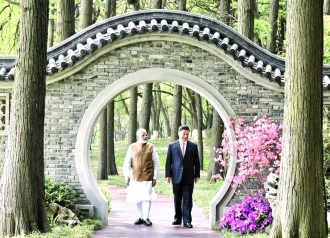Modi-Xi Summit Turns Up Trumps
Date:- 29 Apr 2018

Prime Minister Narendra Modi concluded his informal “heart-to-heart” Wuhan summit with Chinese President Xi Jinping on a positive note. While both the leaders decided to issue “strategic guidance” to their militaries to strengthen communications to build trust and understanding — a move aimed at avoiding a Dokalam-like situation in the future — they also agreed to undertake a joint India-China economic project in war-torn Afghanistan, much to the displeasure of Pakistan.
While agreeing with Modi for collaboration in the areas of spirituality, trade, technology, tradition and entertainment, Xi told the PM that he wants screening of more Bollywood movies in China. Modi and Xi were seen enjoying an instrumental rendition of 1982 Bollywood superhit song “Tu, tu hai wahi dil ne jise apna kaha,” from movie ‘Yeh Vaada Raha’ by Chinese artists in Wuhan. “President Xi said that he had seen a number of Indian films, both Bollywood and regional, and that it would be a good idea that more Indian films come to China and more Chinese films go to India,” Foreign Secretary Vijay Gokhale informed the media.
“China and India should be good neighbours and good friends. They should regard each other as an active factor in the change of world power,” Xi said.
At the end of the two-day informal summit in the central Chinese city, Modi and Xi underscored the importance of maintaining peace and tranquility in all areas of the India-China border region in the larger interest of the overall development of bilateral relations. “We discussed ways to give impetus to our economic ties as well as people-to-people relations. Other areas we spoke about include agriculture, technology, energy and tourism,” Gokhale said.
“They issued strategic guidance to their respective militaries to strengthen communication in order to
build trust and mutual understanding and enhance predictability and effectiveness in the management of border affairs,” he said.
The two leaders directed their militaries to earnestly implement various confidence building measures agreed upon between the two sides, including the principle of mutual and equal security, and strengthen existing institutional arrangements and information sharing mechanisms to prevent incidents in border regions. The two sides have held 20 rounds of talks to resolve the boundary dispute and worked out different mechanisms to keep peace along the 3,488-km long Line of Actual Control.
On the contentious Belt and Road Initiative (BRI) project, China said there is no fundamental difference with India on the issue of “inter-connectivity” and Beijing will “not be too hard” with New Delhi on the issue of the.
On agreeing to undertake a joint India-China economic project in war-torn Afghanistan, the two sides will identify the project in follow up discussions and work out the modalities. This will be the first such project in the war-ravaged country by India and China. China’s decision to team up with India in Afghanistan could upset Pakistan, which considers Beijing as its “all weather ally”, sources said.
Modi and Xi recognised the common threat posed by terrorism and committed to cooperate further on counter-terrorism, Gokhale said. Asked whether the issue of Jaish-e-Mohammad chief Masood Azhar was raised, he said the two leaders “did not go into specifics”. China has repeatedly blocked India’s bid to designate Azhar as a global terrorist by the UN.
Modi mentioned the importance of balancing the trade, and the scope of the possibilities of agricultural and pharmaceutical exports to China. During the meetings, Xi pointed out that China-India relations need to be stable and development based on mutual trust.
The two leaders also discussed climate change, sustainable development and food security and shared their experience in terms of the preservation of the Yangtze - China’s longest river - and the Ganga - India’s longest river. They discussed how to promote sports between the two countries and how to strengthen tourism on the Buddhist circuit. They reiterated the importance of building an open, multi-polar, pluralist and participatory global economic order.
Courtesy: Pioneer- Sunday, 29 April 2018 | PTI | Wuhan (China)


